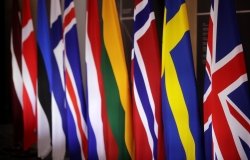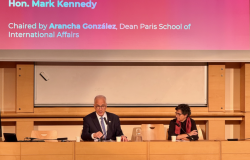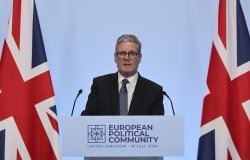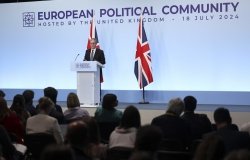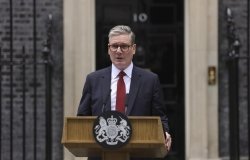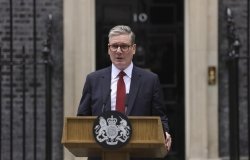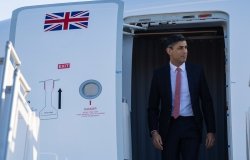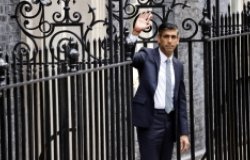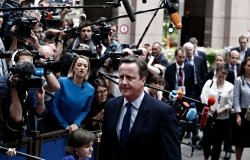Northern Ireland - the Dissonant Voice in Brexit

Shutterstock/Anthony Kenny
Local elections will be held in Northern Ireland on May 5, like elections in all the United Kingdom (UK). But the pro-UK Democratic Unionist (DUP) in Northern Ireland (NI) are treating this election as the last opportunity to tell Westminster that the Protocol with the European Union (EU) has to be scrapped. If not, they are leaving the power sharing agreement reached in 2020 with the nationalist party, Sinn Fein.[1]
Already protest parades ahead of the local elections have the flutes, drums and rhythm of marches typical of July’s marching season. Women with white gloves and determined smiles lead the parades, carrying their flags to protest the checks on goods crossing the Irish Sea, a necessity created by the Protocol.
The Protocol was meant to ensure that the island of Ireland remained a single geographic unit with no land border between the North, as member of the UK, and the Republic of Ireland, a.k.a. Eire, a member of the EU. A land border risks the return of religious and class warfare which had riven the North with ‘the Troubles’ since the 1970s. Furthermore, American leaders with their influential Irish population had insisted that peace achieved in 1998 through the Good Friday Agreement endure.
To respect that peace, Westminster and Brussels agreed upon a Protocol to create border controls for goods shipped between the UK and NI across the Irish Sea. Custom checks and inspections are required at both British and NI ports.[2] Few were the exceptions, but the DUP saw these border checks as a rejection of their right to be British citizens. Thus, the protests.
The protests begin before dusk and end at night fall with speeches protesting the Unionist’s political exclusion. The May 5 elections will also elect members of the Stormont Assembly, a critical legislature to Northern Irish autonomy from the UK at Westminster. Protesters fear that their culture and identity as British citizens will slip away and that slowly they will become absorbed into a united Ireland. Demographics encourage this anxiety as Catholics are expected to outnumber Protestants by mid-century.
Polls indicate that Sinn Fein will emerge the strongest party.[3] Michelle O’Neil would head the government and is likely to strengthen ties with Eire leading, eventually, to a united Ireland. Thus the fear and anger among the Unionists directed both at Westminster and at the Protocol. “The choice is simple, we either kill the Protocol or it kills the union. [The Protocol] is a devil’s pit,” claimed a young loyalist firebrand.[4] The leader of the DUP called out to his followers, “Until the Protocol is removed we will not see a functioning executive at Stormont because democracy must prevail.” Others threaten bloodshed and memories of the ‘Troubles’ in which 3,532 people died between 1969 and 2001 make moderate citizens shudder.[5]
Prime Minister Boris Johnson has promised reform of the Protocol, but his room to further amend this agreement is limited. Brussels remains adamant that the UK not be used as an entry point to the EU avoiding tariffs. Therefore trade between the UK and Eire should be subject to custom controls. Brussels has treated the Protocol as an internal UK problem, but the implications for Eire reverberate in Washington. The Good Friday Agreement has maintained the peace and US Senator George Mitchell’s role is a source of considerable pride.
The May elections have significant consequences for three issues: the Protocol, power-sharing in Stormont and the Good Friday agreement. However, for most voters in Northern Ireland, jobs, health and welfare are more important than constitutional issues. Sinn Fein has focused on the cost of living and healthcare, issues that resonate among the Unionist as well as its supporters. If Michelle O’Neil focuses on those issues and stays away from the border and unification, she is likely to gain a significant lead over the DUP. The Northern Irish are pragmatic, believing that NI needs to move ahead by working. For them, the price of cold meats is more important than the complexities of the Protocol.
However, DUP candidates are ready to energize their followers and the protest marches are vigorous. So the cameras will run and nightly news will be filled with the clamor of drums and flags. It will be enough to remind Washington that it must insist on respect for the Good Friday Agreement and advise Westminster to work with Brussels in making the Protocol more palatable.
However, Boris Johnson and his Foreign Secretary Liz Truss, are believed to have agreed to legislation that would give ministers sweeping powers to tear up the Protocol no matter the consequences with Brussels.[6] Anticipating the Unionist protests and their probable walk-out of the power sharing agreement should they do poorly in the election, the Prime Minister has the legal authority under Article 16 of the Protocol to take “appropriate safeguard measures” such as suspending border checks on goods between Britain to Northern Ireland.
Invoking Article 16 is likely to spark anger in Brussels and EU capitals. Back in the fall of 2021, the EU indicated that it could suspend its Trade & Cooperation Agreement with the UK.[7] But the Prime Minister can justify using Article 16 due to the significant increase in two-way trade between NI and Eire while 50 percent of Northern Irish businesses have said that the Protocol has had a negative impact on their business with the rest of the UK.[8] The EU has heard these arguments before and criticized fiercely the threat to invoke Article 16. But Commissioners recognize pragmatically that it cannot start a trade war with the UK or tear up the Trade Agreement. More strategic security issues concerning Ukraine take priority at this time, and the EU will avoid provoking Western Europe’s leading provider of armaments to Ukraine.
So Boris Johnson may well decide to yell, “To Hell with Brussels bureaucrats” as he campaigns for his candidates in the May 5 local elections throughout the whole UK.
[1] Northern Ireland Power Sharing Agreement. The 1998 Agreement established a power-sharing system of government, based on a con-sociational model of democracy. Arend Lijphart designed this model for societies emerging from conflict, or those with the potential for conflict.
[2] Diana Negroponte, The Northern Ireland Protocol, Global Europe program, Wilson Center. June 16, 2021, https://www.wilsoncenter.org/article/northern-ireland-protocol-means-more-sausage-war
[3] Sinn Fein is the nationalist party favoring unification with Eire and remaining within the EU
[4] Rory Carroll, “The March of Time: Unionism Braced for an Election that Could Put Sinn Fein in power.” The Guardian, 24 April, 2022.
[5] Statistical breakdown of deaths in the Troubles of Northern Ireland, 1969-2001, https://belfastchildis.com/lost-lives/the-troubles-1969-1998-statistical-breakdown-of-deaths-in-the-troubles/
[6] Peter Foster et al. “UK prepares law to tear up N Ireland post-Brexit agreement” Financial Times, April 22, 2022.
[7] EU-UK Trade & Cooperation Agreement, December 30 2020. https://ec.europa.eu/info/strategy/relations-non-eu-countries/relations-united-kingdom/eu-uk-trade-and-cooperation-agreement_en
[8] Article 16, the EU and the Protocol. https://ukandeu.ac.uk/article-16-eu-protocol/
About the Author

Diana Villiers Negroponte

Global Europe Program
The Global Europe Program is focused on Europe’s capabilities, and how it engages on critical global issues. We investigate European approaches to critical global issues. We examine Europe’s relations with Russia and Eurasia, China and the Indo-Pacific, the Middle East and Africa. Our initiatives include “Ukraine in Europe” – an examination of what it will take to make Ukraine’s European future a reality. But we also examine the role of NATO, the European Union and the OSCE, Europe’s energy security, transatlantic trade disputes, and challenges to democracy. The Global Europe Program’s staff, scholars-in-residence, and Global Fellows participate in seminars, policy study groups, and international conferences to provide analytical recommendations to policy makers and the media. Read more


